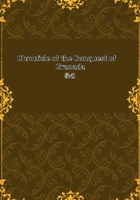
第7章
The Moorish inhabitants looked jealously at this small but proud array of Spanish chivalry, as it paraded, with that stateliness possessed only by Spanish cavaliers, through the renowned gate of Elvira. They were struck with the stern and lofty demeanor of Don Juan de Vera and his sinewy frame, which showed him formed for hardy deeds of arms, and they supposed he had come in search of distinction by defying the Moorish knights in open tourney or in the famous tilt with reeds for which they were so renowned, for it was still the custom of the knights of either nation to mingle in these courteous and chivalrous contests during the intervals of war. When they learnt, however, that he was come to demand the tribute so abhorrent to the ears of the fiery monarch, they observed that it well required a warrior of his apparent nerve to execute such an embassy.
Muley Abul Hassan received the cavalier in state, seated on a magnificent divan and surrounded by the officers of his court, in the Hall of Ambassadors, one of the most sumptuous apartments of the Alhambra. When De Vera had delivered his message, a haughty and bitter smile curled the lip of the fierce monarch. "Tell your sovereigns," said he, "that the kings of Granada, who used to pay tribute in money to the Castilian crown, are dead. Our mint at present coins nothing but blades of scimetars and heads of lances."*
*Garibay, 1. 40, c. 29; Conde, Hist. Arab., p. 4, c. 34.
The defiance couched in this proud reply was heard with secret satisfaction by Don Juan de Vera, for he was a bold soldier and a devout hater of the infidels, and he saw iron war in the words of the Moorish monarch. Being master, however, of all points of etiquette, he retained an inflexible demeanor, and retired from the apartment with stately and ceremonious gravity. His treatment was suited to his rank and dignity: a magnificent apartment in the Alhambra was assigned to him, and before his departure a scimetar was sent to him by the king, the blade of the finest Damascus steel, the hilt of agate enriched with precious stones, and the guard of gold. De Vera drew it, and smiled grimly as he noticed the admirable temper of the blade. "His Majesty has given me a trenchant weapon," said he: "I trust a time will come when I may show him that I know how to use his royal present." The reply was considered a compliment, of course: the bystanders little knew the bitter hostility that lay couched beneath.
On his return to Cordova, Don Juan de Vera delivered the reply of the Moor, but at the same time reported the state of his territories.
These had been strengthened and augmented during the weak reign of Henry IV. and the recent troubles of Castile. Many cities and strong places contiguous to Granada, but heretofore conquered by the Christians, had renewed their allegiance to Muley Abul Hassan, so that his kingdom now contained fourteen cities, ninety-seven fortified places, besides numerous unwalled towns and villages defended by formidable castles, while Granada towered in the centre as the citadel.
The wary Ferdinand, as he listened to the military report of Don Juan de Vera, saw that the present was no time for hostilities with a warrior kingdom so bristled over with means of defence. The internal discords of Castile still continued, as did the war with Portugal: under these circumstances he forbore to insist upon the payment of tribute, and tacitly permitted the truce to continue; but the defiance contained in the reply of Muley Abul Hassan remained rankling in his bosom as a future ground of war; and De Vera's description of Granada as the centre of a system of strongholds and rock-built castles suggested to him his plan of conquest--by taking town after town and fortress after fortress, and gradually plucking away all the supports before he attempted the capital. He expressed his resolution in a memorable pun or play upon the name of Granada, which signifies a pomegranate. "I will pick out the seeds of this pomegranate one by one," said the cool and crafty Ferdinand.
NOTE.--In the first edition of this work the author recounted a characteristic adventure of the stout Juan de Vera as happening on the occasion of this embassy; a further consultation of historical authorities has induced him to transfer it to a second embassy of De Vera's, which the reader will find related in a subsequent chapter.